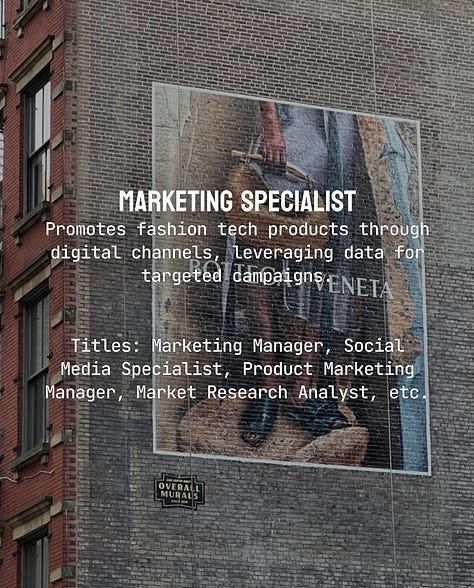Navigating the Fashion Tech Industry: Key Roles and Responsibilities
Fashion tech roles often require a blend of fashion knowledge, technical skill, and an understanding of consumer behavior in the digital age.
The fashion tech industry is dynamic, with roles evolving as new technologies emerge. This list is not exhaustive of every role, but here is an overview of the common roles that drive this field.
Technical Roles
Software Engineers/Developers:
These roles are the core of fashion tech, developing software for virtual fitting rooms, complex marketplaces, and sophisticated e-commerce platforms. Developers often specialize in areas like mobile app development, web development, or backend systems, using languages like JavaScript, Python, or HTML/CSS.
Data Scientists/Analysts:
These roles analyze trends, customer behavior, and sales data to inform design, marketing strategies, and inventory management. Utilizing machine learning and AI, they help predict trends, optimize supply chains, and personalize customer experiences.


AR/VR Specialists:
With the rise of virtual try-on technologies and immersive retail experiences, AR/VR specialists create realistic digital environments where customers can preview products in a lifelike setting.
Product and Project Management
UX/UI Designers:
User experience (UX) and user interface (UI) designers ensure that digital products are not only aesthetically pleasing but also intuitive and user-friendly. They work on everything from e-commerce websites to mobile fashion apps, ensuring accessibility and ease of use.
Product Managers:
They bridge the gap between tech and fashion, defining the product vision, managing the product lifecycle, and ensuring that the development aligns with both market needs and brand identity.


Project Managers:
Responsible for overseeing projects from conception through to delivery, they coordinate between different departments to ensure deadlines are met, and products are launched successfully.
Marketing and Sales
Digital Marketing Specialists:
These experts leverage SEO, content marketing, social media, and influencer partnerships to increase brand visibility and drive sales. They're pivotal in crafting campaigns that resonate with tech-savvy consumers.
E-commerce Managers:
They manage online sales platforms, ensuring smooth operation, high conversion rates, and customer satisfaction. This includes everything from site usability to payment processing and logistics.
Sales Representatives:
Focusing on both B2B and B2C, they use data-driven insights to personalize sales approaches, whether selling directly to consumers or to retailers and wholesalers.



Customer and Brand Success
Customer Success Managers:
They ensure customers have a positive experience post-purchase, managing feedback loops, and helping to refine products or services based on user interaction.
Brand Success Analysts:
These roles focus on maintaining and enhancing brand reputation through strategic analysis of brand performance across platforms, ensuring brand consistency and customer loyalty.
Community Managers:
Vital for engaging with the brand's community online, they manage forums, social media interactions, and events to build a dedicated following and foster brand advocacy.
Support Roles
Quality Assurance (QA):
They test software and tech products to ensure they meet quality standards before going to market, crucial in an industry where both aesthetics and functionality are paramount.
Supply Chain Analysts:
They optimize the logistics of manufacturing and distribution, ensuring that innovative fashion tech products reach markets efficiently and sustainably.
Legal and Compliance Officers:
With the integration of new technologies, these professionals ensure that all products and practices comply with privacy laws, intellectual property rights, and other regulations.
The fashion tech industry is a melting pot of creativity and technology, requiring a diverse set of skills to bring concepts to life. From developers coding the next big app to designers ensuring that technology enhances rather than detracts from the fashion experience, each role plays a crucial part in shaping the future of fashion. As the industry continues to evolve, these roles will not only grow in number but also in complexity, promising an exciting frontier for professionals at the intersection of fashion and tech.






